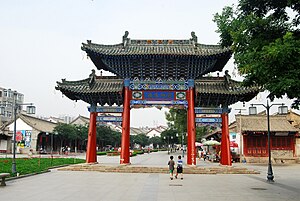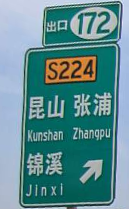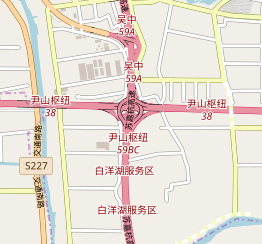Chinese tagging guidelines
This is a recommended tagging guide for those who want to map in mainland China.
The overview of other marked tutorials is the index of the editorial standards of the People’s Republic of China. It is recommended to read other articles while reading this article.
This article is outdated in a lot of content, it is recommended that you follow the Chinese version
Legality
It is simply illegal to map in China or to draw maps of China. To stay out of trouble, we at the OSM China community advice you:
- DO NOT USE ANY HIGH-ACCURACY SURVEYING EQUIPMENT IN CHINA!
- DO NOT MAP MILITARY AND ANY OTHER FORBIDDEN AREA WHICH MAY CAUSE DAMAGE TO NATIONAL SECURITY!
- DO NOT MAP DISPUTED OR SENSITIVE AREAS!
- BE CAREFUL WHEN USING OPENSTREETMAP FOR COMMERCIAL PURPOSES IN CHINA!
Just try not to get noticed; if you get noticed, don't get caught.[1] Armchair mapping is probably fine, as long as you remain anonymous.
Names
- Default name tag uses local script, which is simplified Chinese for mainland China area. Names in other languages including those in ethic minority languages should be mentioned as the name:lang=* field.[2]
- Name in English name:en=* should follow official naming. For other currently widely-used transliteration, use separate tag int_name=*.[3]
- The name tag should use the name convention used by locals in daily life. Full names can be added under secondary tags. For example:
- “积石山 ‛
保安族东乡族撒拉族自治’ 县” - 安洛
苗族彝族满族乡 > name=安洛乡+name:en=Anluo+name:zh=安洛乡+official_name=安洛苗族彝族满族乡+official_name:en=Anluo Miao, Yi and Manchu Ethnic Township.
- “积石山 ‛
Administration
- Main article: China/Boundaries
(Only have Chinese document)
Transport
Highways
- This table provides editors a recommended tagging guide. For those special circumstances which may not be included, please refer to highway=* for conventional usage.
- When mapping National/Regional route system, editors should follow their administrative level instead of their physical conditions, from G (National) class to C (Village) class in a descending order (from trunk to unclassified)
- For ex/old-National/Regional Routes, consider them in common circumstances instead of using the road type of their former level.
- To describe the quality of the surface. See surface=* for more information.
- As for urban roads, editors should tag based on a principle that the distinction between different roads is clear. Thus, road tagging should depend on its importance in the whole network (elucidated in the underlined parts) instead of numbers of lanes or quality of surface.
- The residential areas, commercial areas and industrial areas mentioned in this table are referred to landuse=* or amenity=* areas divided into minimum units (e.g. XX community, XX commerce center/plaza, XX factory/corporation), instead of broadly speaking large functional areas.
| Key | Value | Element | Possible circumstance | Comment |
|---|---|---|---|---|
| Roads | ||||
| highway | motorway |
|
||
| highway | trunk |
|
| |
| highway | primary |
|
Only used to tag a few of the most important major roads in a city. | |
| highway | secondary |
|
Note that in large cities, X-routes may have important function in suburbs, some X-routes may have already been a part of urban road network or may perform as feeders between more important highways. In conditions similar to those mentioned above, you may tag them wholly or partly as highway=primary. | |
| highway | tertiary |
|
||
| highway | unclassified |
|
||
| highway | residential |
|
||
| highway | service |
|
||
| Link roads | ||||
| highway | motorway_link | The link roads (sliproads/ramps) leading to/from a motorway from/to a motorway or lower class highway. Found at exits, junctions and some service areas. | Add oneway=yes or oneway=no | |
| highway | trunk_link | The link roads (sliproads/ramps) leading to/from a trunk from/to a trunk or lower class highway. | ||
| highway | primary_link | The link roads (sliproads/ramps) leading to/from a primary road from/to a primary road or lower class highway. | ||
| highway | secondary_link | The link roads (sliproads/ramps) leading to/from a secondary road from/to a secondary road or lower class highway. | ||
| highway | tertiary_link | The link roads (sliproads/ramps) leading to/from a tertiary road from/to a tertiary road or lower class highway. | ||
| highway | motorway_junction |
|
| |
| Special roads | ||||
| highway | pedestrian |
|

| |
| highway | track | Roads for mostly agricultural or forestry uses. | This tag is not describing the quality of a road but its use. | |
| highway | raceway | Courses or tracks for (motor) racing in regular F1, bumper cars or other racing games. | Do not use it for sport courses other than racing. | |
| Paths | ||||
| highway | footway |
|
||
| highway | bridleway | Designated paths mainly for horses. | ||
| highway | steps |
|

| |
| highway | cycleway | Designated paths mainly for cyclists. | ||
| highway | path | Trails not applicable for footway/bridleway/cycleway | ||
Railways
| Key | Value | Element | Possible Circumstance | Comment |
|---|---|---|---|---|
| railway | rail | If known: | ||
| railway | subway | Mass, usually underground, transit tracks/routes in major cities(e.g. subway, metro) | Do not mistake routes with a minority of elevated tracks for railway=monorail | |
| railway | tram | Tracks/routes for tram vehicles, usually share roads with automobiles | ||
| railway | monorail |
|
Do not mistake routes with a minority of tunneled tracks for railway=subway | |
| railway | construction |
Railways under construction |
Use railway=construction + construction=rail |
| Type | Tag | Comments |
|---|---|---|
| Aviation | ||
| Civil Airport | aeroway=aerodrome | Depicts the figure by following the gate fence around the airport. |
| Taxiway | aeroway=taxiway |
|
| Runway | aeroway=runway | Include overrun and threshold segment. |
| Apron | aeroway=apron | |
| Parking Position | aeroway=parking_position | Use as a way element when mapping parking guidance line;use as a node element when mapping parking position |
| Navigation | ||
Natural environment
Reservoirs
China has a large number of reservoirs, formed by man-made dams. Use natural=water with water=reservoir.
References
- ↑ The US military has a funny concept called "survivability onion" that basically says this. Maybe don't bring it into any China discussion.
- ↑ Names#Localization
- ↑ Names#Avoid transliteration


